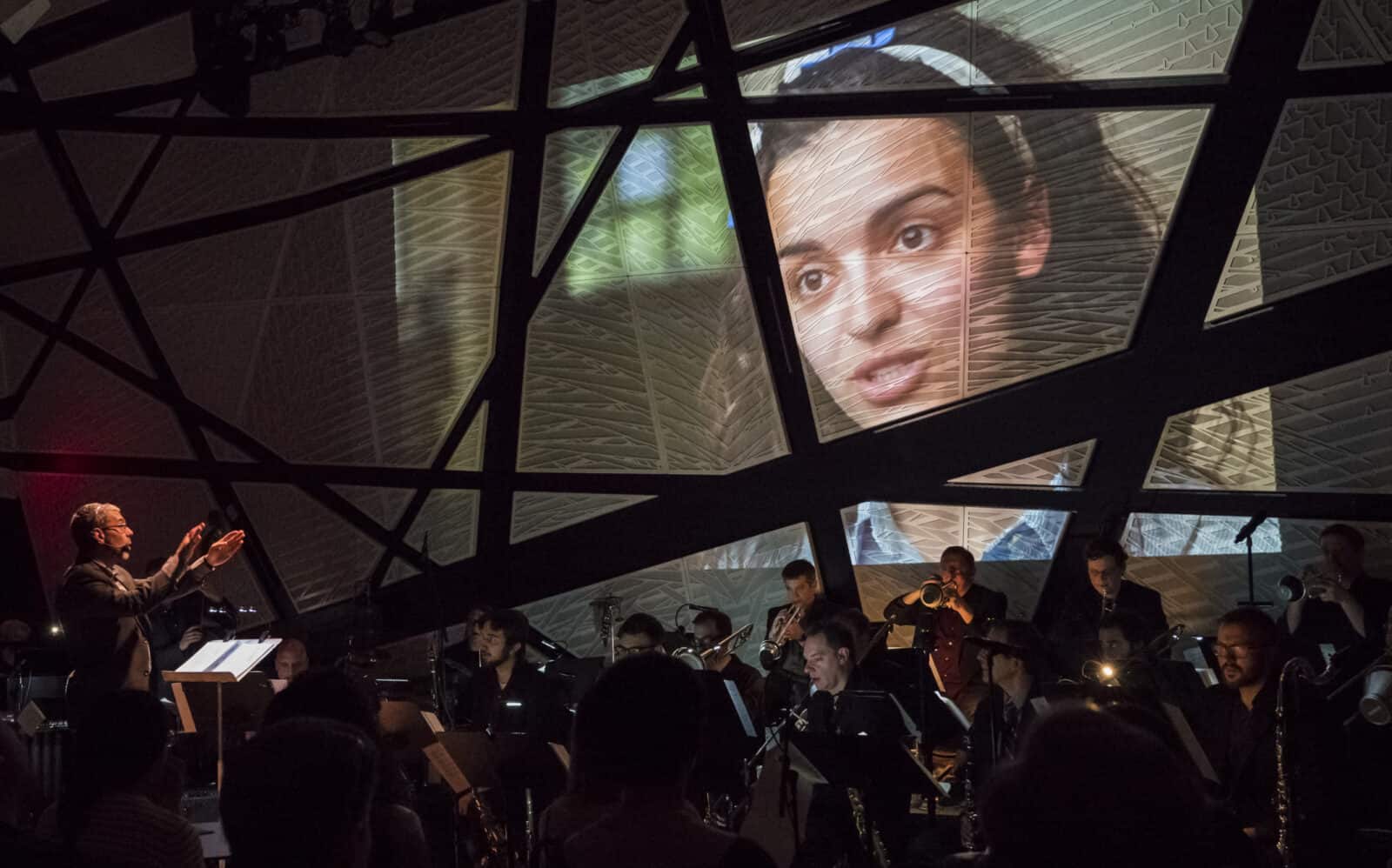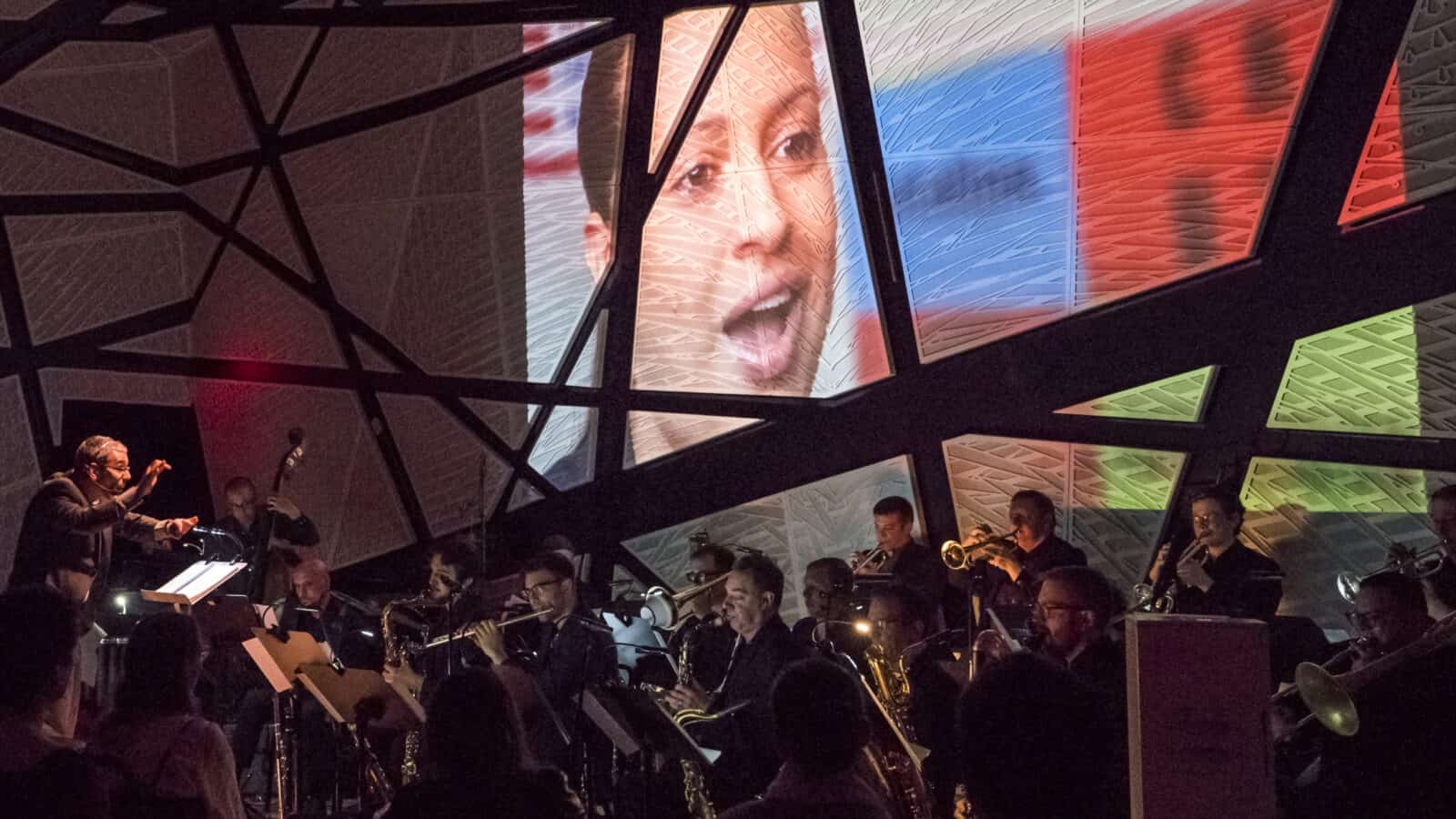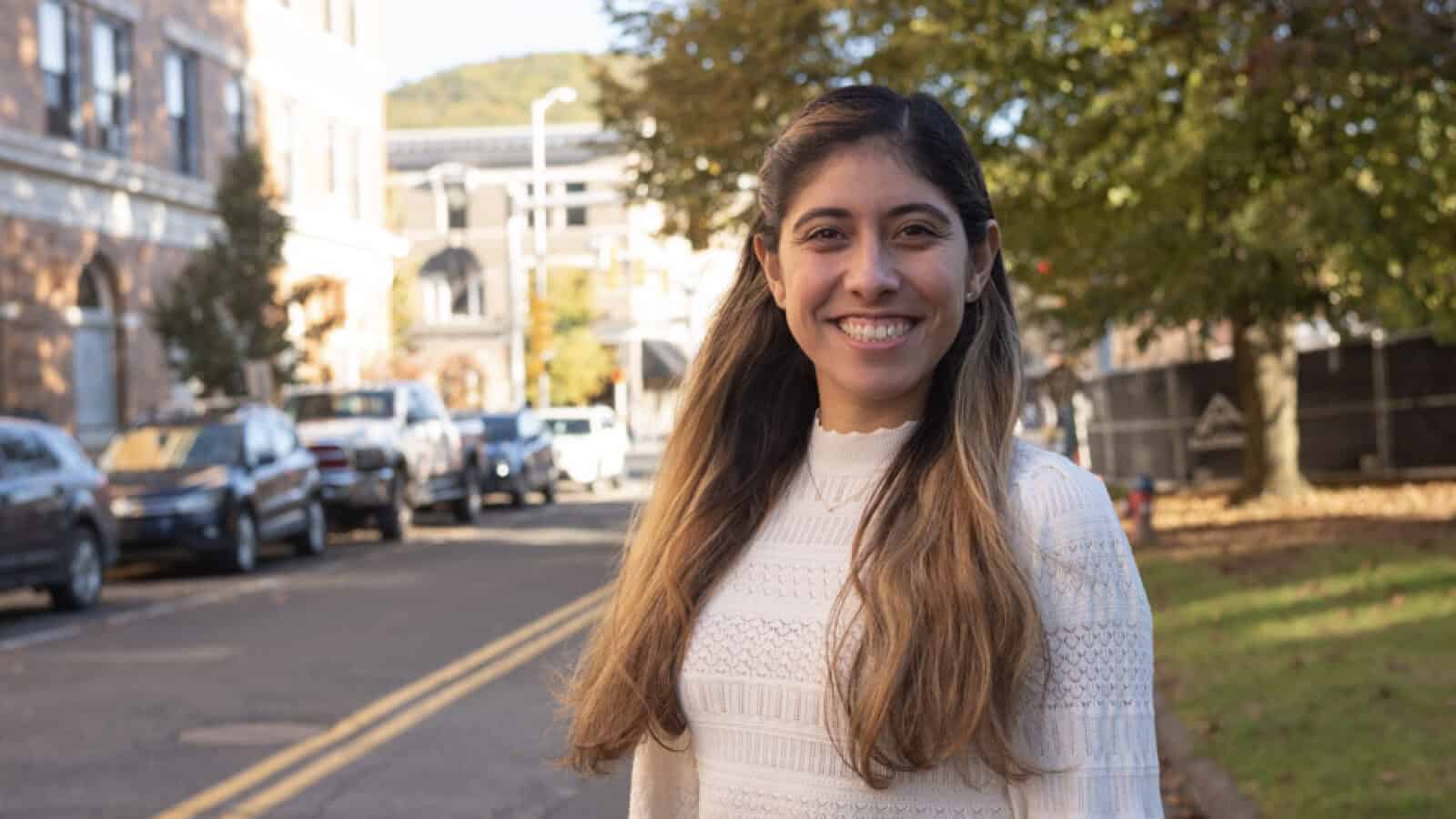Melissa Canavan sits down with Bryan Aviles and Nathan Davis at the Bridge Office on a rare sunny afternoon. As BRIDGE interns, they have been exploring the diverse experiences and relationships of people who live in the Berkshires — and she is working to grow them. Since May 2023, she has led as the executive director of the Berkshire Immigrants Center.
She and her husband have gotten to know people and places and creative work here in many ways, she explained, and have worked to strengthen and celebrate them. She is creating her own, within the local ecosystems of nonprofits and the arts, from many directions.
She first came to the Berkshires from Southern California as an intern at Jacob’s Pillow Dance Festival and director of her own dance company, the Melissa Martinez Project, and she has quickly become an active volunteer with Latinas413 and served as director of the new Spanish-language Community Advisory Network at the Mahaiwe.

Film and music tell the stories of people new to this country as Felipe Salles and his ensemble perform 'Dreamers: An Immigrant Experience' with Berkshire Immigrant Center, Berkshire Theatre Group and the West Stockbridge Historical Society. Press photo courtesy of the artists
Bryan: What draws you to this kind of work to begin with?
Melissa:
Well, to simply put it, I’m first generation, so my parents both came from Mexico.
Bryan:
Same. (laughter)
Melissa:
So for me it’s in my blood. It’s what makes up my family — it’s what drives my personal mission in terms of legacy, in terms of continuing the work that my parents did and all the efforts that they made to do the hardest part, which is to come over to another country and then also establish a foundation so that I could thrive and continue in ways that they could only dream.
I feel very fortunate, because I feel like I am doing that — living out (my life) in a way that’s authentically me, but also a way that I feel honors all their hard work — and they’re still doing hard work to this day. I have a sibling too who’s still in their household, so they’re still working just as hard, if not harder, to make sure.
‘It’s in my blood. It’s what makes up my family — it’s what drives my personal mission, in terms of continuing the work that my parents did.’ — Melissa Canavan
And even though I didn’t get into the work that I’m doing now until later in life … I feel very privileged to have not only received my undergraduate degree but my master’s as well. So a part of me naturally … has always wanted to give back.
I started volunteering, before getting this role, with Latinas 413, and I was thinking I love what they’re doing — they’ve got goals and they’ve got the drive, all they need is money, so let me help out with some grant writing, because that’s the easy part. I if I can get you guys the funding then you can do the part that really is going to have an impact.’
But then someone rightly pointed out (that) to a lot of people, the grant writing piece is actually really hard.
Bryan:
Yeah. (laughter and affirmation)
Melissa:
And maybe it goes back to how I was brought up, but to me, that’s how I want to give back — through my experience, through my knowledge, through my education and the skills that I’ve developed over the years.
(I want to give back through) being able to provide the opportunities for others, immigrants andpeople who haven’t had the chance to thrive in the ways they deserve to, and in the ways that make them shine.
Bryan:
Completely, that was a great — that was beautiful. I was like, “Snap, snap, snap.” … So that’s what drew you to your line of work, but what draws you to the East Coast?
Because there’s a big difference between West Coast and East Coast immigration. So what are your thoughts on why the East Coast, and why here?
Melissa:
I grew up, born and raised, in Southern California. (And that influenced) a lot of what I was used to, culturally, because California is right on the border with Mexico, so (I was raised in a community with) Mexican culture.
I am Mexican, so for me … the issue of diversity was not obvious to me. I never felt like a minority, even with other races and cultures and ethnicities. There was always a broad representation, in a classroom or in going to the mall or going to whatever it might be. Soto me, diversity wasn’t outwardly something that I felt like I needed initially to pay attention to, because I just never felt othered.
I came out here because I got an internship at Jacobs Pillow Dance Festival, and originally I was only going to stay here for three years, after I got a full-time position. But I did find my spouse out here. And he’s not from here, but we met here, and we got to like experience our relationship in the Berkshires.

Film and music tell the stories of people new to this country as Felipe Salles and his ensemble perform 'Dreamers: An Immigrant Experience' with Berkshire Immigrant Center, Berkshire Theatre Group and the West Stockbridge Historical Society. Press photo courtesy of the artists
And then over time, we got to become a part of the community in a way that we appreciated. Now we’ve had eight years of living here, and through my career I’ve been able to make connections with people. I knew about BRIDGE because I was at the Pillow … So I was able to bridge my connections, once I got specifically in this line of work. But I think what made me want to stay here is that I was able to see the support systems that exist here.
Since I grew up in a city with more than 100,000 people … I didn’t necessarily see the same kinds of deep connections. I was within little communities, like the dance community, or in high school you create your own little groups. But I think here it’s so much more tight knit, and people really do know you, or they read about you in the newspaper.
My husband and I have grown to enjoy supporting local businesses, and valuing individual people and what they’re contributing to this great community. I think that’s what drew us to stay.
How have you connected with the Latinx community here over time?
Melissa:
When I first moved here, I was focused on how do I connect with young people. So I didn’t immediately connect with the Latino community. It really started when I was at the Mahaiwe, when I was doing work on the Spanish language community advisory network, when I started really connecting with the Latina community.
That’s when I connected with Latinas 413. And that’s what led me into the Berkshire Immigrant Center. And then I’ve been able to appreciate the diversity that exists here — although it may not be not overt the way it is in Southern California, it actually is (visible here) in a lot of ways — it’s just that you don’t see it (in the same ways).
That may be in part because of the number of groups that are being represented. … You may have 10 Mexican families, but you actually also have five Colombians and five Venezuelans, so (in that way) there’s more diversity within the Latino community here.
‘I was able to realize a new beauty within the Latino culture that I have never experienced.’
And I think once I started being able to see it, or I was able to engage with it more, I was able to realize a new beauty within the Latino culture that I have never experienced, just because the majority of the people that I knew growing up were (most likely) Mexican — maybe other people from South America, but I feel like the majority that I experienced were Mexican.
And also my family — because culturally, I think a lot of Latino families are huge (quiet laughter) — so a lot of the time I was spending time with family. And so that was my exposure.
But to see (a diversity of cultures) in a way that I’ve never experienced or even engaged with, in terms of going to restaurants that have opened up in Pittsfield with different food that I’ve never actually (tried) …
(I can be) talking to people and joking around about how one person might say a word in Spanish this way, but culturally, the way we speak it, the word is actually this, you know, and laughing about that — or just hearing people’s stories and how they got here … because I have my family’s story, but that doesn’t mean that’s the same story for everybody either.
So it’s cool to connect in ways that I think uniquely make us and shape us into who we are today.
How do we genuinely connect with each other …
Melissa:
… There are so many things that make up people. Your job is not what defines you. It’s your interests. It’s your skills, your personality. There are whole different ways we can identify (with) people that have nothing to do with where you came from, what school you went to, and what job you hold, or have held.
(To Bryan and Nate) I’d love to be able to know that you’re a journalist upcoming, but what particularly interests you is the connection with people. That’s what makes you you, is connecting. It’s not being a journalist — that just happens to be an outlet through which you do that, but (the way) to get to the core of who you are is by asking you a different set of questions.
‘What particularly interests you is the connection with people. That’s what makes you you, is connecting … (the way) to get to the core of who you are is by asking you a different set of questions. It’s by asking you the personal stuff … and that takes time.’
It’s by asking you the personal stuff … that takes time. We live in a society in which time moves so quickly that I don’t think we’ve ever gotten to that point of naturally getting there as a society, other than (asking questions) like what’s your job and what school did you go to?
And it’s a shame, because what makes us us is really exciting.
Bryan:
And it’s beautiful at the same time.
I heard this analogy from, — you might know Professor, Asma Abbas, at Bard College at Simon’s Rock?
She always has this good analogy on race and perspective. It’s like a flower, and you’re trying to get to the inside of the flower — you’re pulling these layers, and that’s what you see on the inside, but the reality is what is the human — that’s what we should be, and that’s what the real beauty is — as we’re peeling (through layers), we’re discovering where the beauty of humanity is.
And how you’re saying … we don’t have enough time, and I wish everyone could sit down and have two-hour conversations like this.

